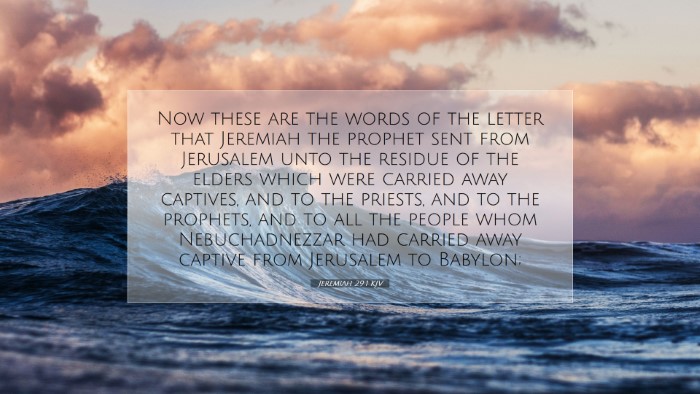Jeremiah 29:1 (KJV): "Now these are the words of the letter that Jeremiah the prophet sent from Jerusalem unto the residue of the elders which were carried away captives, and to the priests and to the prophets, and to all the people whom Nebuchadnezzar had carried away captive from Jerusalem to Babylon."
Context and Background
In this verse, we begin to explore the profound communication from the prophet Jeremiah to the exiles in Babylon. This letter contains God’s guidance and promises to His people who find themselves in a foreign land, struggling with displacement and uncertainty. Understanding this context is essential for proper interpretation and application.
Jeremiah prophesied during a tumultuous period for Judah, as the kingdom faced imminent destruction and exile. His ministry was marked by unwavering confrontation of sin and false prophecy during King Zedekiah's reign. The letter serves as a pivotal point, assuring the exiles that they are not forgotten by God but are under His sovereign plan.
Insights from Matthew Henry
According to Matthew Henry's commentary, Jeremiah’s letter underscores the importance of communication in times of distress. He notes that God addresses His people even when they are in captivity, directing the elders, priests, and all the populace with hopeful and practical advice.
- God's Oversight: Henry emphasizes that God is aware of the struggles faced by His people. He reassures them that despite their current predicament, they are part of His divine plan.
- Community Response: The mention of "the residue of the elders" reflects the collective nature of their experience. God’s message is not just for individuals but for the community, which is essential for unity and resilience in trials.
- Word of Encouragement: The letter serves as a beacon of hope, encouraging the captives to persevere and flourish in their new environment while maintaining their identity as God’s chosen people.
Insights from Albert Barnes
Albert Barnes offers a perspective highlighting the significance of the written word and its role as a source of guidance. He notes the irony that while the people are exiled far from Jerusalem, God's Word still reaches them to provide clarity and direction.
- Longing for Home: Barnes indicates that the exiles yearned for Jerusalem, and this longing materializes through the prophet's message. He paints a vivid picture of the emotional state of the captives, who needed to know that God had not abandoned them.
- Prophetic Authority: The authority of Jeremiah as a prophet is crucial. His words are not merely counsel but divine communication that carries the weight of God's promises.
- Encouragement to Settle: Barnes expounds on the practical advice to 'build houses and dwell in them.' This reflects God’s intention for His people to invest in their present context and cultivate their spirituality amidst adversity.
Insights from Adam Clarke
Adam Clarke brings an analytical lens to the text, emphasizing the theological implications of Jeremiah’s letter. He explores themes of exile, divine providence, and restoration.
- Understanding Exile: Clarke notes that exile is not solely punishment but serves a greater redemptive purpose in God's plan, teaching His people dependence and repentance.
- Divine Reassurance: He underscores the assurance of God's presence even in alien lands. The letter is an affirmation that God’s covenant with Israel still holds, promising eventual restoration.
- The Role of Prophets: Clarke highlights the necessity of prophetic voices across generations. Jeremiah embodies faithfulness and truth, guiding the people through uncertainty.
Theological Themes
Jeremiah 29:1 highlights several pivotal theological themes relevant to both historical and contemporary audiences:
- God’s Sovereignty: Amidst adversity, God remains in control. Even in exile, He orchestrates events for the eventual good of His people.
- Community and Identity: The letter addresses the community, reminding them to hold on to their identity as God’s chosen. It encourages collective action and faithfulness.
- Hope and Restoration: God’s promise of future restoration is a central theme of this passage, affording hope to those who feel lost.
Application for Modern Readers
For pastors, students, and scholars, the implications of Jeremiah 29:1 continue to resonate powerfully today:
- Pastoral Care: Understanding the needs of those in distress—be they physically, spiritually, or emotionally—encourages empathetic engagement and ministry.
- Encouragement in Trials: Like the exiles, modern believers often find themselves in difficult circumstances. This passage serves as a reminder that God is present and provides hope.
- Commitment to Community: Today’s church is called to be a supportive community, analogous to the collective addressed by Jeremiah, urging faithfulness and growth.


